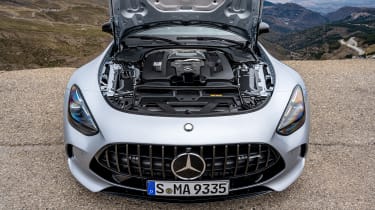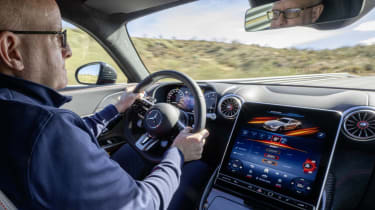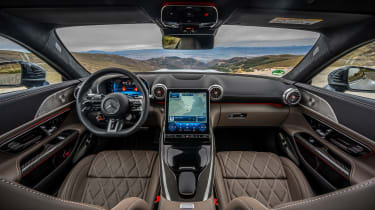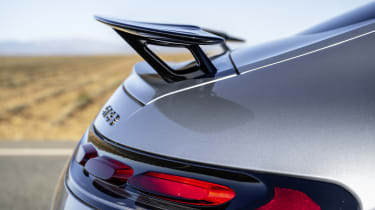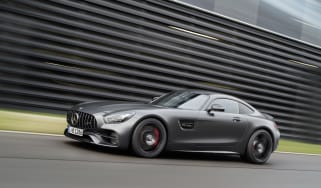Mercedes-AMG GT 2025 review – is it now a match for the Porsche 911?
A sophisticated new chassis, up to 805bhp and a more practical cabin provides the AMG GT with everything it needs to take on the best in the business
evo verdict
The second-gen AMG GT is more capable, more advanced and has a broader spread of abilities than the car it replaces, just as Mercedes intended. It’s a fantastically effective sports GT car that makes cover ground at a startling rate a doddle, but all that complexity does come at a price.
It’s heavier, less wieldy and more detached than a 911, and though we love the fact that AMG is still building a bruising V8 coupe in 2025, the engine lacks the thunderous aural thrill you’d expect from an Affalterbach product, sounding synthetic inside the cabin. It’s a very accomplished car, but one we respect rather than absolutely adore.
Background and model range
The Mercedes-AMG GT was always a curious beast. Positioned between a grand tourer and a super-sports car it never quite decided what it wanted to be. It was a schizophrenic torn between taking on anything from an Aston Martin DB11 to a Porsche 911 Turbo. As impossible tasks go, the original AMG GT had one.
Now, the second-generation AMG GT has arrived with a tighter brief – to take on the Porsche 911 head on as the ultimate usable sports car. That means it includes a pair of optional 911-esque rear seats and a larger boot (two core customer requests), making it 180mm longer and 70mm taller but the same width as the old car (the GT S, not the wider GT C). At 1895kg it’s also 325kg heavier, much of this down to the now standard fitment of 4Matic+ four-wheel drive and enough upgrades to the chassis hardware and software to make an engineer’s head spin in excitement.
More reviews
If you’ve assumed that the GT is simply a coupe version of the SL, you’d be wrong. While both cars share a considerable amount of componentry from their platforms up, there’s plenty of difference between them. Because while they were developed at the same time, they were designed as very individual cars. Every component that required changing was changed, and every piece of software that needed lines of new code was updated. According to AMG the GT is very much its sports car, the SL its GT car. But has the shift in philosophy resulted in a compelling alternative to a 911, or does the new AMG GT’s more rounded approach dilute its appeal?
Engine, gearbox and technical highlights
- Engines from a 416bhp four-pot right up to an 800bhp+ hybrid V8
- McLaren-style hydraulically interlinked dampers work with rear-steer and four-wheel drive
- It’s a heavy beast – over 2.1 tons in hybrid spec
The new GT is leaps and bounds ahead of the old car in terms of sophistication. Tech highlights include rear-wheel steering, an electronically controlled limited-slip diff, active aero and AMG Active Ride Control, which uses hydraulically interconnected dampers. Standard-fit 4Matic+ four-wheel drive is key in giving the GT the breadth and all-round usability that AMG is aiming for.
Drive to the front axle is via an electromechanically controlled clutch incorporated into a transfer case attached to the tail of the gearbox. Drive is sent forward to the front wheels via an open diff, while at the rear is an e-diff, a locking diff that also has an electromechanical clutch-pack controlling the amount of locking. A nine-speed automatic gearbox is bolted to the engine, instead of being part of a transaxle as before, to free up boot capacity.
The AMG GT remains predominantly rear-drive, sending drive to the front on demand when additional traction is required and to help with the dynamics at the limit. At most, 50 per cent of the V8’s torque can be sent to the front wheels, while there is a Drift mode that locks out drive to the front entirely so that 100 per cent of the engine’s output goes to the rear axle.
The amount of torque sent to the front in other modes is determined not by the drive mode but by the ESP setting selected. The driver can choose from ESP On, ESP Sport Handling and ESP Off, the latter two being more rear-biased.
The torque split is continuously variable, based on feedback from sensors monitoring the entire vehicle architecture. The more focused AMG GT Pro uses the same set-up but with water cooling of the transfer case and front and rear diffs to maintain the ideal oil temperatures during trackdays and the like.
The Pro also gains subtle aero modifications to reduce lift by 30kg at the front axle and 15kg at the rear, as well as 21-inch forged wheels, Michelin Cup 2 tyres and an enormous ceramic brake package with 420mm front discs as standard. No AMG GT is lightweight, with even the four-pot coming in at 1715kg. The GT 55 is chunkier still at 1895kg, while the E Performance crushes the scales at 2120kg.
Power, torque and 0-60mph time
Numerous powertrain options are available, with varying states of tune from 415bhp up to almost double that. The entry-level car is the GT43, which uses the 2-litre turbocharged four-pot you’ll find in AMG’s hot hatches, producing 415bhp and 369lb ft. Step up to the GT55 and you get a 4-litre twin-turbocharged V8 with 469bhp and 516lb ft, with the GT63 jumping up to 577bhp and 590lb ft.
The Pro gets more power to go with its track focused upgrades, with its V8 peaking at 604bhp and 627 lb ft. But it’s the catchily named, plug-in hybrid GT63 S E Performance that takes top honors in the power stakes – and by some distance. By adding an electric drive unit on the rear axle, consisting of an e-motor, two-speed transmission and mechanical limited slip diff, powered by a 6.1kWh battery above it, you get a colossal 805bhp. With the e-motor driving through a two-speed gearbox and the engine connected to the nine-speeder, calculating the maximum combined torque is tricky, but Mercedes quotes between 797 and 1047lb ft.
No GT is slow, with even the four-cylinder GT 43 reaching 62mph in 4.6sec and running to a 174mph top speed. The V8 GT55 trims the 62mph time down to 3.9sec and hits 183mph, while the 63 gets down to 3.2sec, topping out at 196mph. As you’d imagine, the E Performance is ballistic, getting to 62mph in just 2.8sec and maxing out just shy of 200mph.
Model |
Power |
Torque |
0-62mph |
Top speed |
| Mercedes-AMG GT43 | 415bhp | 369lb ft | 4.6sec | 174mph |
| Mercedes-AMG GT55 | 469bhp | 516lb ft | 3.9sec | 183mph |
| Mercedes-AMG GT63 | 577bhp | 590lb ft | 3.2sec | 196mph |
| Mercedes-AMG GT63 Pro | 604bhp | 627lb ft | 3.2sec | 197mph |
| Mercedes-AMG GT63 S E Performance | 805bhp | 1047lb ft | 2.8sec | 199mph |
Driver’s note
‘In the GT63 Pro, the V8’s delivery is explosive but not unmanageably so, and given the momentum you’re already carrying into braking zones on track, you never feel like you need more.’ – Yousuf Ashraf, evo senior staff writer, who drove the AMG GT63 Pro at Ascari circuit on the launch.
Performance, ride and handling
- Four-wheel drive adds nuance to the GT’s on-limit handling
- E Performance is mind-bendingly ballistic
- Rides more calmly than the old car
It’s impossible not to be impressed by the AMG GT’s ability to cover ground. It’s not as communicative or as nuanced as a 911 GTS, but it is satisfying to pick apart a great road, the GT lapping up your commitment and feeling almost unshakable. But this isn’t a wild, lairy, thunderous coupe like the old car was – although it’s undeniably more accomplished, its character has been diluted in some ways.
The main reason for this is the noise. EU regulations mean the NASCAR soundtrack of AMG’s V8 has been watered down, and boosted by synthetic tones inside the cabin generated via a microphone within the exhaust system. The results aren’t all that convincing. This noise reduction also means it’s harder to gauge the V8’s delivery. It remains a monumentally punchy motor, even though it’s hauling a considerable amount of weight, but the sound is such that there’s little change in tone and you can find yourself butting into the rev limiter.
Hunt around in third, fourth and fifth and the 63 delivers serious 911-troubling space – not Turbo levels, more GTS – and you are quickly hooked into the process, pulling gears on corner exit to shrink the subsequent straights. Leave the transmission in auto and it’s no slouch either, the shift mapping intuitive both up and down the ratios. Meanwhile, in the E Performance, such is the torque on offer that it feels like it only needs two or three gears, rather than nine. It’s explosively fast, the e-motor covering any initial gaps in the V8’s delivery before it rips through the revs relentlessly. The way it bolts down the road is staggering.
But it’s the GT’s chassis that carries the surprises and delight. In Comfort and Sport the GT is a far softer and more benign car than it was before, and overall is all the better for it. Some tyre noise resonates around the cockpit but there’s a mellowness to how the car flows; there’s a fluidity to low- and medium-speed driving, a suppleness to its behaviour that makes it a more convincing GT car.
Where the new GT ups the ante over its predecessor is when you dial the modes up. Sport+ locks everything down, but rather than turning the chassis into a bobsled it adds precision and alertness. There’s more weight to the steering – more an attempt to suggest feel than anything else – but it suits the GT when you begin to hustle it along. The front end no longer feels like a distant relative and hunts into a corner with far more conviction. Although there’s plenty of grip from the tyres you still find yourself making small adjustments to judge the level of purchase with the surface. With only up to 50 per cent of the engine’s torque fed to the front axle the GT63 always feels a resolutely rear-driven car, driving through a turn and exiting with a squat from the rear, albeit with plenty of traction unless you get greedy with your right foot or provocative with your hands.
On track, you can fully explore this balance – and for lap after lap if you find yourself in the more durable GT63 Pro. On warm Cup 2s it turns in with an alacrity that you just don’t expect from a 1.9-ton front-engined car. There is an undeniable sense of heft, but the platform resists roll, and the way the wide front tyres dig in, working with the rear-axle steering, means you can carry momentum into an apex as you would in something lighter. Traction is gently managed before the V8 rips onto the next straight and through its nine gear ratios. When it’s time to stop the Pro’s carbon ceramics are powerful and more durable than the standard iron discs, which can fade during hard road use.
In damp conditions, the Pro is mighty, despite the scantily treaded Michelins, but when you eventually reach the limit it can bite back and leave you chasing your tail. In this sense, it's not as intuitive or feelsome as a 911 GTS, which paints a clearer picture of available grip through its steering and gives you more confidence at the limit. By comparison, the GT is more numb in your hands, forcing you to drive on your wits rather than feel. Don’t take this to mean that the GT63 Pro isn’t fantastically effective and entertaining, because it absolutely is. It’s just that squeezing the last bit of performance from it requires a bit of a leap, and some understanding of how the four-wheel drive works. When power overcomes grip at the rear you need to settle into the slide and maintain a constant throttle, keeping your corrections to a minimum and allowing the electronics to figure out where to send the torque.
With practice you can get the GT dancing all the way through a corner, working with small slip angles and feeling the front axle helping to drag you towards the exit. It’s hugely satisfying – even more so than when the GT is in its most lairy Drift mode. In this setting, big, smokey slides are possible, but it’s less progressive and harder to manage than when set to 4WD, and you lose that incredible sense of forward thrust under power.
Driver’s note
‘It’s an AMG that has immense levels of deployable all-weather performance on the road. Think somewhere between a classier and less quirky R35 GT-R and a ballsier 911 Turbo. It’s a helluva thing. And mostly thanks to the effects of 4Matic+.’ – Dickie Meaden, evo editor-at-large, who drove the AMG GT63 at Anglesey circuit.
MPG and running costs
- Up to a claimed 27.5mpg from four-pot models
- A set of replacement 21-inch tyres will cost upwards of £1400
You’re unlikely to be considering an AMG GT to cut down your fuel bills, but if efficiency is a concern, the GT43 is your best bet. Officially, it’ll achieve 27.5mpg, where the 55 and 63 only just get over 20. Despite being a PHEV the E Performance is no better than the four-pot – presumably because of the significant extra weight it carries – at 26.7mpg.
With so much power and weight to punish its consumables, the AMG GT won’t be cheap to run. When it’s time to change tyres, expect to pay over £1400 for a brand new set of 21-inch items from Pirelli or Michelin.
Interior and technology
- Rear seats are only suitable for small children, or extra storage space
- Cabin is mostly free of switchgear, with touch panels and screens taking over
- Packed with tech but little in the way of design flair
Outgoing AMG GT owners will appreciate the added practicality of the latest model’s optional rear seats, although they are only suitable for small children. To accommodate that second row the front passenger compartment has been moved forward by 200mm; not only does this mean the acreage of bonnet real estate ahead of you appears to have shrunk, but front-seat occupants have less space to move around in than before. For the driver it means the loss of the ‘legs outstretched and backside on the rear axle’ sensation, while the passenger can’t stretch their legs out if they’re taller than 5ft 10in, even with the seat set as far back as it will go.
Despite the shift forward, the driving position is still evocative, with a high scuttle, high window lines and enough bonnet ahead to almost give VLN racer vibes. The sense of sitting on the rear axle may have gone, but the associated loss of connection between driver and car is perceived rather than reality.
Being a modern Mercedes the interior is a mix of full-size central tablet screen that looks like an afterthought and a steering wheel overburdened with haptic controls. The screen runs Mercedes’s MBUX system, which is feature rich but a little fussy on the eyes as it packs the majority of major functions – including the climate controls – within it. As with the SL, the new GT would benefit greatly from having a more classic approach to where and how its controls are positioned. As it stands, it doesn’t feel like an imaginatively designed, special cabin, which it should for the price.
Price and buying options
The AMG GT starts at £105,435 for the GT43, which is punchy for a four-cylinder sports coupe. The base 911 Carrera sits in the same region at £103,700, but that’s hardly a value proposition either. For a lighter, purer but less usable sports car Lotus will sell you an Emira Turbo SE for £89,500, equipped with the same AMG four-pot as the GT43. To get the best out of the base car it’s worth spending £4000 on the AMG Dynamic Plus Package, which includes AMG Ride Control suspension, an electronic limited-slip rear diff and dynamic engine mounts.
From here it’s a huge jump to the GT55, which comes in at £142,200 and is aimed squarely at the £137,900 Porsche 911 Carrera GTS. It’s less rewarding to drive and less powerful than the Porsche but does at least come with the aforementioned Dynamic Plus Package as standard, along with rear-axle steering and of course a twin-turbo V8. Maserati’s GranTurismo also sits in this bracket, offering a calmer and more practical GT vibe.
Next up is the £163,500 GT 63, which creeps into Aston Martin Vantage territory. Again, the AMG struggles to match its rivals for value – the Aston is more powerful, more entertaining and feels more bespoke. Ironic, as the Aston borrows a version of the very same V8 engine. The GT 63 Pro is more expensive again at £179,350, and though it is more resilient and capable on a circuit than the standard car, you need to be an avid track driver to benefit from the changes – at which point we’d save £21k and buy a 911 GT3.
At the £186,290 list price of the GT 63 E Performance, the likes of the Aston Martin DB12 and nearly new Ferrari Romas are on the table. Less powerful they may be but the AMG can’t match them for drama or exclusivity. The Ferrari in particular has a kind of sharpness and finesse that the GT can’t replicate.
If you’re happy to look at last-gen super coupes on the used market, the GT has some highly desirable metal to compete with. Low mileage DBS Superleggeras can be had for £140k, as well as the previous Bentley Continental GT. And for an ultra intense front engined supercar, early Ferrari F12s sit temptingly in the £120k bracket.



